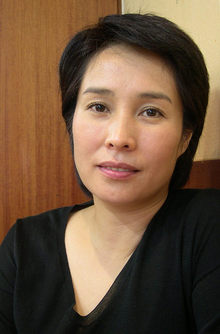 |
Controversial Yasukuni Shrine also memorializes Taiwanese dead
Kaochin Sumei, the indigenous Taiwanese legislator known internationally for her role in the Ang Lee film The Wedding Banquet, is in Seoul for a conference organized by the Korean Committee for Joint Action Against Yasukuni. On Thursday she said that resolving "the problem of Yasukuni" is something that would contribute to the "peace and prosperity of East Asia." Kaochin says she first became interested in the Yasukuni issue in August 2002, when she saw a picture of indigenous Taiwanese people being executed by Japanese soldiers. She said that, in addition to the killings, because of Japan’s assimilation policies, the descendants of indigenous Taiwanese people have lost their sense of identity and have forgotten what happened during colonial rule. Soon, she began to research historical documents from the period about the fate of indigenous people, and learned that 28,000 Taiwanese have memorial tablets enshrined at Yasukuni, which also honors Japanese war dead, including those classified as war criminals by international bodies. Later, Kaochin was party to a lawsuit in Japan asking for a court to declare Japanese prime minister Junichiro Koizumi’s visits to worship at the Yasukuni Shrine unconstitutional, and in 2005 the Osaka High Court sided with the plaintiffs. Prime Minister Koizumi’s visits to the shrine have angered the international community, particulary in Taiwan, South Korea, and China, which bore the violent brunt of Japanese militarism.Next month, Kaechin intends to file another suit demanding the removal of memorial tablets from Yasukuni Shrine that bear the names of indigenous Taiwanese people conscripted into the Japanese military. "The Japanese didn’t even treat indigenous people like regular soldiers, but now they use people who died because of them as war gods," she said. "Yasukuni Shrine confuses the issue of who are the perpetrators and who are the victims. It steals the rights of all peoples to have their own cultures. The Japanese government is infringing on civil rights for enshrining memorial tablets of people who died without their families’ approval," she added. While in Seoul, Kaochin met with South Korean prime minister Han Myung-sook. She says the prime minister told her that it is unfortunate that Korea’s foreign ministry would be unable to help in resolving the Yasukuni issue, but that as prime minister she would seek ways to help anyway. "The Korean government only talks about its concerns regarding Japan’s turn to the political right," she said. "But the Taiwanese government doesn’t even do that much." Kaochin plans to be in Japan on August 14, the day before the anniversary of Korea and Taiwan’s liberation from Japan, for a candlelight protest in Tokyo’s Meiji Park.






